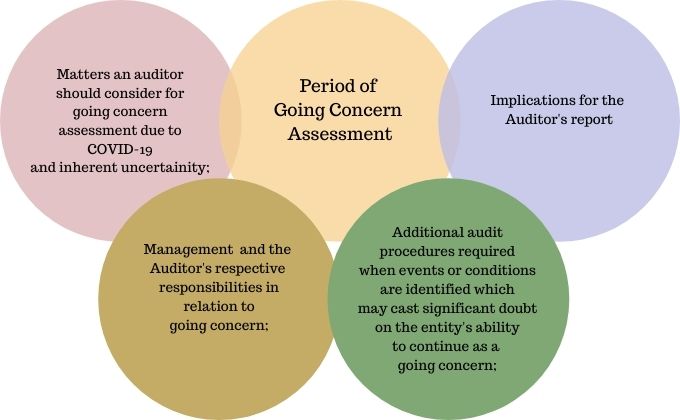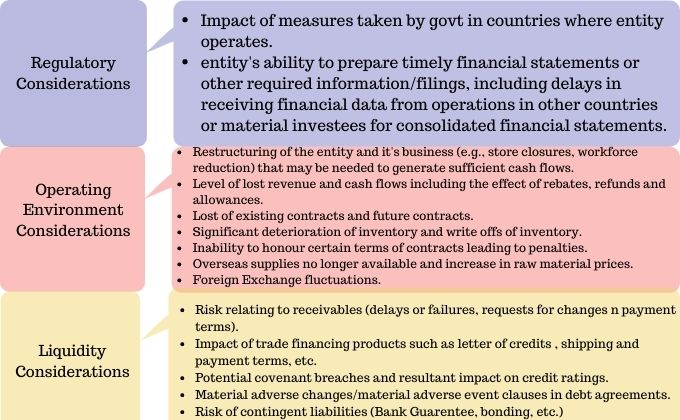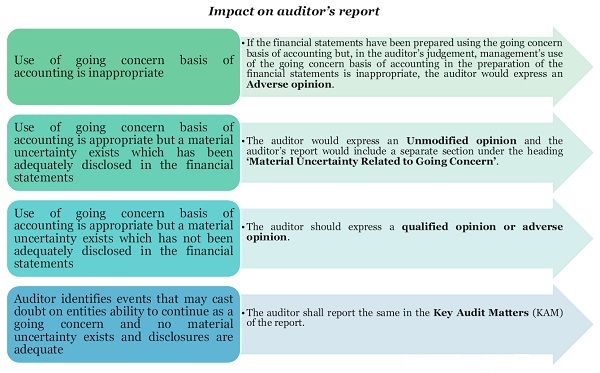
Background
Section 134(5) of the Companies Act, 2013 requires board of directors of every company to state in its Directors’ Responsibility Statement that they have prepared the annual accounts on a going concern.
Ind AS 1 – Presentation of Financial Statements and AS 1 – Disclosure of Accounting Policies requires the management to assess the entities ability to continue as a going concern.
Given the financial vulnerabilities due to Covid-19 and business interruption for substances in practically all areas, there is probably going to be an expansion in occasions and conditions which may provide reason to feel ambiguous about a noteworthy the qualifies capacity for proceed as a going concern.
Recent Development
The International Accounting and Auditing Standards Board (IAASB) and The Institute of Chartered Accountants of India (ICAI) have given direction on going concern appraisal in the midst of COVID-19 for organizations and contemplations for an inspector while assessing the administration's evaluation.
Some of the important considerations highlighted by the ICAI guidance are as follows:

- Evaluate what impact the current events have on an entity's operations and forecasted cash flows.
- Consider the current and foreseen impacts of the COVID-19 on the suspicions.
- Assess specific matters relating to COVID-19. Few examples are highlighted below:

Key Points
- The auditor should consider the following mitigating factors:
- Capital expenditure reductions;
- Reduction in dividends;
- Suspension of non-performance based bonuses;
- Deferral of payments of principal and interest;
- Working capital reduction, taxation payment holidays or deferrals or COVID-19 driven government funding.
- In evaluating the entities capacity to proceed as a going concern, the management will consider for in any event however not restricted to a year from the end of reporting period.
- In case after the reporting period, management determines that it intends to liquidate the entity or cease trading, or that it has no realistic alternative but to do so, the financial statements may require a fundamental change in the basis of accounting (e.g., to liquidation basis of accounting), rather than an adjustment to the amounts recognised within the original basis of accounting.
Additional audit procedures when events or conditions are identified
- Analysing and discussing cash flow, profit and other relevant forecasts with management.
- Analysing and discussing the entity’s latest available interim financial statements.
- Reading the terms of debentures and loan agreements and determining whether any have been
- Inquiring of the entity’s legal counsel regarding the existence of litigation and claims.
- Confirming the existence, legality and enforceability of arrangements to provide or maintain financial support with related and third parties.
- Evaluating the entity’s plans to deal with unfilled customer orders.
- Performing audit procedures regarding subsequent events to identify those that either mitigate or otherwise affect the entity’s ability to continue as a going concern.
- Confirming the existence, terms and adequacy of borrowing facilities.

Why Professional Utilities?
Professional Utilities simplify registrations, licenses, and compliances for your business. With experienced guidance and nationwide support, we help you complete every requirement efficiently and effectively.

Complete Corporate Solutions

PAN India
Assistance

Free Expert
Guidance

Google-Verified
Team

Dedicated Support


.svg)


